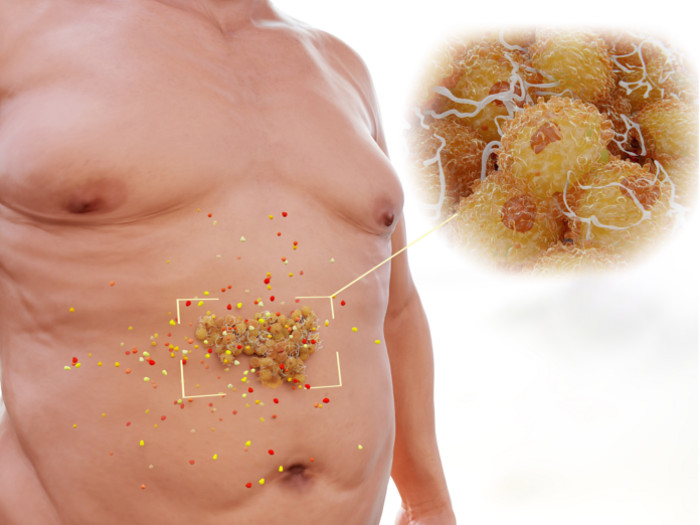Accumulating visceral fat can be very dangerous for your long-term health, but fortunately, there are a number of ways to avoid this problem.
What is Visceral Fat?
Visceral fat is a type of fat that forms inside the abdominal cavity and is considered the most dangerous type of fat, due to its proximity to important organ systems. There are various types of fat in the body, such as subcutaneous fat, which is the fat beneath the skin, and typically easy to see. Visceral fat, however, can wreak havoc on organ function and cause excess inflammation. This fat tends to develop based on your diet, particularly if it is high in simple carbohydrates and sugars, which cause spikes in insulin levels. When your blood sugar levels are out of control, the body stores fat, which leads to weight gain. If you have a belly that extends outward, or if you seem to store an excess of weight in your abdomen, you likely have a high level of visceral fat. [1]
Most experts believe that visceral fat makes up about 10% of the total fat in your body, but the danger comes from their proximity to organs. Since fat tissue can release inflammatory compounds and certain hormones, it can put excess strain on the immune system and cause hormonal imbalances in the body, among many others, as outlined below. [2]

Health Risks Associated with Visceral Fat
The major health risks associated with visceral fat include weight gain, inflammation, dementia, Alzheimer’s, and cancer, among others.
Inflammation
The primary problem with visceral fat is that it releases cytokines, which are pro-inflammatory molecules that can add additional strain to the immune system and lead to other symptoms of metabolic syndrome.
Diabetes
Having an excess of visceral fat has been directly linked to Type 2 diabetes, primarily because eating a lot of simple carbohydrates causes spikes in blood sugar and more fat storage. [3]
Weight Gain
When your body begins storing visceral fat, it will inevitably lead to weight gain and obesity. Due to the changes in your hormone levels, this type of fat can also increase hunger and make it more likely that you will overeat. [4]
Heart Disease
Having too much of this dangerous fat can overload the liver with toxins and other waste products, which will slowly be deposited in the arteries as plaque, which is a major contributor to cardiovascular disease. [5]
Alzheimer’s
Chronic inflammation, which can be caused by having high levels of this fat, can increase your risk of neurodegenerative disease such as Alzheimer’s disease. It can also cause chronic diseases like cancer (Cancer Journal) and rheumatoid arthritis. [6] [7]
How to Get Rid of Visceral Fat?
There are a number of ways to effectively get rid of this dangerous fat, including regular exercise, proper sleep patterns, and healthier eating, among others.
Exercise
If you regularly exercise, your metabolism will speed up, meaning that it will consume and burn more fat and carbs, rather than storing them as visceral fat.
Stress
Having excess stress and anxiety in your life will increase inflammation, which can lead the body to store more of its nutrient intake as this form of fat.
Sleep Patterns
Proper sleep habits are essential to the maintenance of overall health and will regulate your hormones, which will prevent this type of fat deposition.
Sugar Levels
You should consume less sugar and simple carbohydrates, which are the foods that will most readily be stored as this form of fat.
Dietary Changes
Some of the best foods to prevent or eliminate visceral fat include whole grains, lean protein, fresh fruits, and vegetables; overall, you can consume fewer calories to induce fat-burning.
